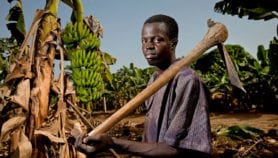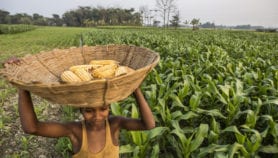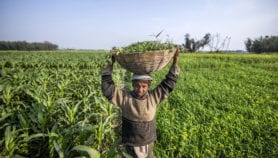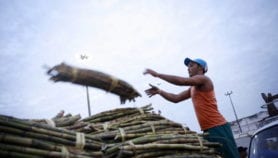By: James Njoroge
Send to a friend
The details you provide on this page will not be used to send unsolicited email, and will not be sold to a 3rd party. See privacy policy.
Two famine-stricken Southern African countries — Zambia and Zimbabwe — have rejected offers of maize from the United States, saying it has not been certified as being free of genetic modification, and arguing that they will only accept maize that has been processed into flour.
Both countries have expressed concern that strains of genetically modified (GM) maize, if planted, could result in genetic material from such strains being transferred to their indigenous varieties. This, they fear, could lead overseas markets, in particular Europe, to reject meat from animals that have been fed on the crop.
Zambia’s vice president, Enock Kavindele, seems to have backed off from an assurance he gave to the World Food Programme earlier this month that his government was prepared to buy US maize to feed about 2.3 million starving people.
In June, Zambia banned the importation of GM maize. At the time, its minister for agriculture, food and fisheries, Mundia Sikatana, said that the country could not risk the lives of its people.
Last Friday (27 July), Kavindele said Zambia would seek advice from local scientists on the safety of GM corn before deciding whether to accept a US$50 million loan from Washington to buy GM maize offered by the United States.
The Zimbabwean government, whose three million people are among the many currently facing starvation in Southern Africa, has similarly rejected 10,000 tonnes of maize from the United States, worth US$5 million, arguing that it lacked certification saying that it was GM-free.
The consignment was re-directed to Zambia, Mozambique and Malawi. While the latter two countries accepted the food, Zambia rejected it, arguing that its safety had not been established.
Local researchers have said that Zimbabwe should not be quick to embrace GM technology, as such a move could jeopardise the country’s beef markets in Europe and elsewhere. Both Zimbabwe and Zambia insist that they will only accept US grain containing GM varieties if it comes fully processed.
The head of the US Agency for International Development (USAID), Andrew Natsios, has criticised the stand taken by the two countries. “There is no way we can send corn that has no [GM varieties] in it,” he told Reuters news agency last week. “If you want maize from the United States, then you will get it genetically modified.”
USAID’s assistant administrator, Roger Winter, acknowledges that the food the two countries are being asked to accept was made up of GM varieties. However he added that he did not consider this to represent a health hazard, and that such varieties were safe as they had been subjected to stringent safety tests in the United States.
Most African countries do not have procedures in place to assess the safety of GM crops. South Africa is the only country in the continent to have rules, introduced in 1998, for the commercial growing of GM food.













